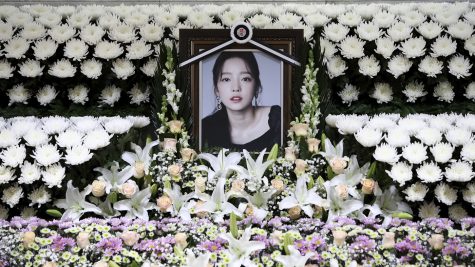Why Western media’s representation of K-pop is unfair
Unraveling how the media chooses to report on issues going on in the industry
Goo Hara (left) and Sulli (right) pose for a selfie together back in 2017.
March 13, 2020
BTS. Blackpink. ITZY. TWICE. Throughout the past few years, K-pop has gradually made its way into Western culture and media, and with that, exposure to disheartening situations following the industry, such as prostitution, forced weight loss, sexual assault, obsessive stalkers and strict contracts, have been collectively labeled as the “dark side of K-pop.” Particularly seen in Western media, this phrase pops up often, especially when something notable happens in the K-pop industry.
However, the reality is that K-pop nowadays will only make Western headlines if a song performs exceptionally well on the charts, or if something tragic and heartbreaking occurs. Just recently in 2019, two female K-pop idols committed suicide six weeks apart, prompting a surge in media coverage of the K-pop industry.
Former f(x) member and soloist Choi Jin-ri, more familiarly known as Sulli, was constantly berated on social media by misogynistic users, mainly because she publicly supported the idea of women going out braless. Though she did not leave a suicide note, Sulli had been open about her struggle with panic disorders and criticism from others.
A few weeks later, singer Goo Hara, who had previously attempted to take her life in May of 2019, was found unresponsive in her apartment. Many believe that her on-going legal battle with her abusive ex-boyfriend, encounters with cyberbullies and fight with depression ultimately led her to take her own life. The misogyny and struggles with mental illness that Goo and Choi faced are not limited to the K-pop industry, as women across the globe experience similar things. Yet when it happens in K-pop, these situations are labeled something that’s specific to the “dark” secrets within the industry.

Goo Hara’s family held a memorial for the singer’s fans, with a portrait of her surrounded by flowers.
There have also been countless reports on entertainment company CEOs sexually harassing trainees or idols, managers forcing their artists to diet until they reach unhealthy body standards, companies selling their trainees into sex trafficking, unfair contracts leading to exhaustion and more. While these issues are definitely important to bring attention to, it seems that Western media only focuses on the faults of the industry, rather than accomplishments and improvements. They claim that they are slowly getting more involved in foreign culture and K-pop, but really, most of them only care about the idea of exposing the industry.
On the surface, it seems like these news outlets care about the well-being of K-pop stars. But when taking a deeper look, it seems that they only care about compartmentalizing the K-pop industry as a toxic, dangerous community. While it is true that K-pop has its downsides, like with everything else, it has its upsides as well.
One of the biggest K-pop companies, JYP Entertainment, started offering monthly mental health check-ins, as well as meetings with a mental health expert, to emphasize the importance of maintaining their artists’ overall well-being. JYP Ent. is not the only company that promotes change and a healthy working environment, yet Western media fails to shed light on these reforms. Though Western media constantly criticizes the treatment of artists in K-pop, they choose not to praise how change is happening and being advocated for.
“At JYP [my label] they have a mental health check once a month. My result came out very low so JYP helped me a lot”
[cr: Jamie Park (박지민) – Cheers To What’s Next | Ep. #1]https://t.co/DOwblzUxJ7 pic.twitter.com/lteDskr4IR— 파룬 (@balloon_wanted) November 1, 2019
Who are these Western reporters to denounce an industry that just so happens to parallel the disgusting things happening in their backyard? Film producer Harvey Weinstein was accused by over 80 women of sexual assault and rape. Record producer Dr. Luke put singer Kesha through years of physical and sexual abuse. Record executives Scooter Braun and Scott Borchet used their authority and power to prohibit Taylor Swift from performing her own songs. Disney’s child star Ricky Garcia was molested by his manager, yet there is barely any media coverage on this.
Where are the never-ending articles on “the dark side of Western-pop” that talk about all these situations? Though there have been a number of articles covering these issues, none of them come to the same conclusion that’s drawn when addressing K-pop — the industry is all bad. Where are the articles that criticize every aspect of the Western entertainment industry, like the ones published about the K-pop industry? Why is there a general consensus that Koreans aren’t already aware of the on-going issues and aren’t making an effort to solve them?
Western media claims to care about the mistreatment going on in K-pop, yet they seem to have a sense of moral superiority where they believe K-pop is still a fresh and foreign concept that needs tailoring before being fully accepted in Western culture. Every industry has its good and bad moments, but when it comes to Western media’s racist tendencies, only the bad moments are highlighted in K-pop.
As The Los Angeles Times reported, the recent Burning Sun scandal, where numerous well-known K-pop artists are involved in sharing unconsented sexual videos of women, as drugging women in the Burning Sun nightclub, broke the K-pop industry’s innocent image.
Though when promoting artists, companies tend to cater to the impression that these celebrities are innocent and perfect. However, what the LA Times fails to realize is that this image of innocence is further encouraged by the media. When Western media creates its own perception of K-pop, that image allows the media to deprecate the industry freely, making it seem like what was once so pure and perfect is now tainted and faulty.
The media isn’t willing to talk about the same things happening in their own backyard in the same manner they address what’s happening in Korea, making it seem like Western media’s coverage of the issues happening in K-pop are due to their feelings of moral superiority after all.
If the media truly wants to enact change and demonstrate that they actually care, they should be focusing on how to actually improve the industry and help decrease mistreatment artists face rather than publishing the repetitive, shallow versions of “the dark side of K-Pop”. A headline centered around “the bright side of K-pop” wouldn’t hurt. To actually make change happen, these articles need to focus on how the industry should fix these issues, not why they should fix them.


















